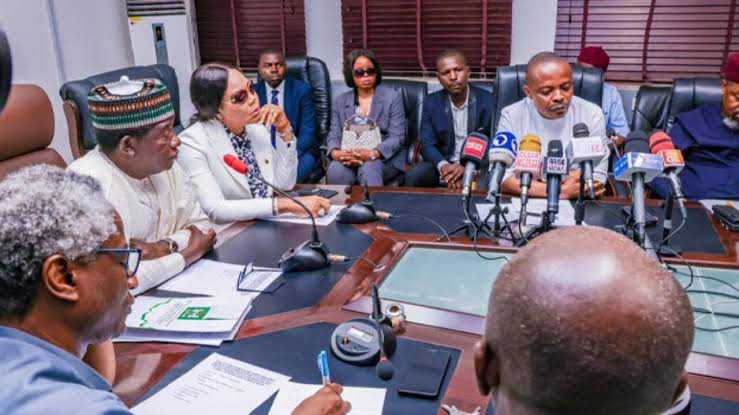The disagreement between the Federal Government and Organised Labour over a new minimum wage is likely to force the Nigeria Labour Congress (NLC) and Trade Union Congress to resume its suspended nationwide indefinite strike action.
Recall that the Tripartite Committee on Friday increased the new minimum wage over from N60K to N62k. But the Organised Labour has made up its mind, insisting on N250,000 figure.
At the end of the meeting last night, the leadership of the tripartite committee said it would forward both positions to President Bola Tinubu who is expected to study them and send a bill to the National Assembly for the final consideration of the new national minimum wage Act.
Recall that the N60K proposal had led the Organised Labour to withdraw from the negotiation table and declared an indefinite strike action to press home its demands.
In the meantime the two labour leaders have described NGF governors’ comment and actions towards the Nigerian workers as act of wickedness, while calling on them to have a rethink before “danger ahead explodes”.
The governors through the Director Media and Public Affairs of the Nigeria Governors’ Forum (NGF), Hajiya Halimah Salihu Ahmed, disclosed on Friday that they couldn’t afford N60,000 that was proposed by the federal government.
But reacting to the governors’ action, the organised labour, through the Head of Information and Public Affairs at the NLC headquarters, Benson Upah, wondered why governors forget that the price of fuel, dollar against Naira among other things have gone up astronomically.
“We are alarmed by the statement credited to the Nigeria Governors Forum that state governments cannot even afford to pay N60,000 as minimum wage as ‘a few states will end up borrowing to pay workers every month’.
“We do believe the governors have acted in bad faith. It is unheard of for such a statement be issued to the world in the middle of an ongoing negotiation. It is certainly in bad taste,” Upah said in a statement.
Speaking on the governors’ claim, the two labour centres said nothing can be further from the truth that FAAC allocations have since moved from “N700 billion to N1.2 trillion making the governments extremely rich at the expense of the people.”
According to them, “All that the governors need to do to be able to pay a reasonable national minimum wage (not even the N60,000) is cut on the high cost of governance, minimise corruption as well as prioritise the welfare of workers.
“It is important to explain here that a national minimum wage is not synonymous with the different pay structures of different states. The national minimum wage is the lowest floor below which no employer is allowed to pay.
“The aim is to protect the weak and the poor. We are not fixated with figures but value. Those who argue that moving the national minimum wage from N30,000 to N60,000 is sufficiently good enough miss the point.
“In 2019, when N30,000 became the minimum, N300 exchanged for $1 (effectively making the minimum wage an equivalent of $100 or thereabout) while inflation rate was 11.40.
“At the moment the exchange rate is at N1,600 to $1 while inflation hovers at 33.7% (40% for food). This puts the value of the minimum wage at $37.5 for a family of six. This is happening at a time costs of everything rose by more than 400% as a result of the removal of fuel subsidy.
“This is an extreme bad news for the poor. Government’s policies of fuel subsidy removal, mindless devaluation of the Naira, energy tariff hike by 250% and interest rate hike by 26.5% will continue to hurt the economy (especially manufacturing sector) and the poor.
“Already manifest is the mass incapacity of Nigerians leading to overflowing warehouses of the productive sector of the economy. The downward trend will continue except the capacity of workers and businesses is enhanced.
“Paying a miserable national minimum wage portends grave danger to not only the workforce but the national economy as in truth, economies of most states are driven by workers wages.
“In light of this, we urge the governors to do a re-think and save the country from a certain death.”
Labour chief, Joe Ajaero had on Tuesday declared readiness to resume the strike if their demands are not met.
At the end of the first day of the devastating strike action on Monday, the SGF, Senator George Akume, spearheaded a meeting with the Labour unions after which a four-point resolution was reached, including a commitment by President Bola Tinubu to pay a new minimum wage higher than the N60,000 offer.
Tinubu directed Edun to present the cost implications for a new minimum wage within two days.
Though Edun has submitted the proposal to the president, it has not been made public.



